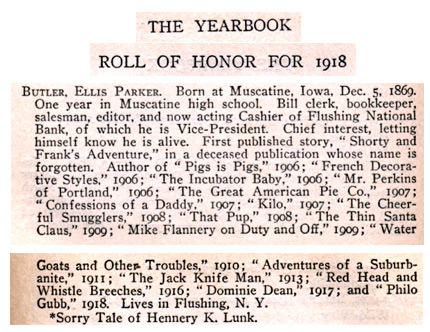 printer friendly printer friendly
- BIO-ANTHOLOGY: The Best Stort Stories of 1918 (1918) "Portrait" Edited by Edward J. O'Brien (b. 1890, d. 1941). Small, Maynard and Company. Boston. 441 pages. O'Brien was killed in the WWII blitz of London. [BEST]
from The Best Stort Stories of 1918
Portrait
The Best Short Stories of 1918 and the Yearbook of the American Short Story is one volume of a series of such books edited by Edward J. O'Brien starting in 1916 and continuing until at least 1938.
Each year's volume reprinted the editor's choice for the best short stories of the year. Each volume also included an index of short stories published that year in the major magazines together with commentary by Mr. O'Brien.
In 1918, there are two entries for Ellis Parker Butler. The first was a short biography:
Butler, Ellis Parker. Born at Muscatine, Iowa, Dec. 5, 1869. One year in Muscatine high school. Bill clerk, bookkeeper, salesman, editor, and now acting Cashier of Flushing National Bank, of which he is Vice-President. Chief interest, letting himself know he is alive. First published story, "Shorty and Frank's Adventure," in a deceased publication whose name is forgotten. Author of "Pigs is Pigs," 1906; "French Decorative Styles," 1906; "The Incubator Baby," 1906; "Mr. Perkins of Portland," 1906; "The Great American Pie Co.," 1907; "Confessions of a Daddy," 1907; "Kilo," 1907; "The Cheerful Smugglers," 1908; "That Pup," 1908; "The Thin Santa Claus," 1909; "Mike Flannery on Duty and Off," 1909; "Water Goats and Other Troubles," 1910; "Adventures of a Suburbanite," 1911; "The Jack Knife Man," 1913; "Red Head and Whistle Breeches," 1916; "Dominie Dean," 1917; and "Philo Gubb," 1918. Lives in Flushing, N. Y.
*Sorry Tale of Hennery K. Lunk.
The second was the selection by the editor of a Butler story as one of "The Best Sixty American Short Stories" for January to October, 1918. The stories were listed alphabetically by author's name:
7. THE SORRY TALE OF HENNERY K. LUNK, by Ellis Parker Butler (Harper's Magazine). This tale of a mournful mariner ashore on the banks of the Mississippi would have delighted Mark Twain. I hope Mr. Butler will forgive me if I state that it contains more poetry than prose. But after all, mournful mariners come and go, while their stories go on forever.


BACK TO READING ROOM
TO TOP OF PAGE
|